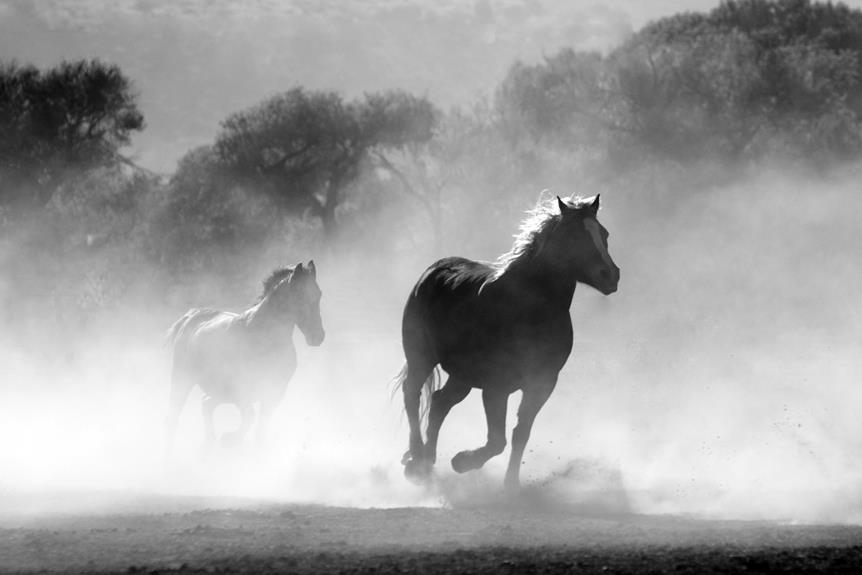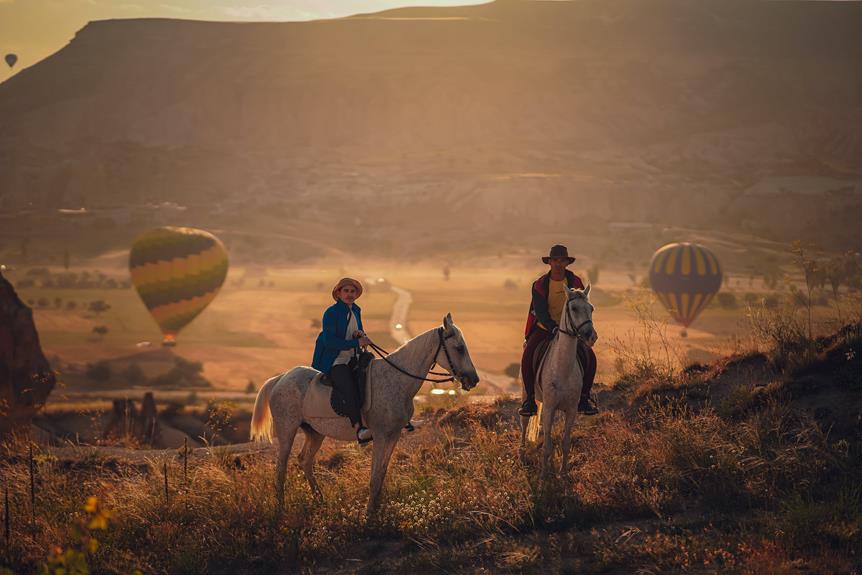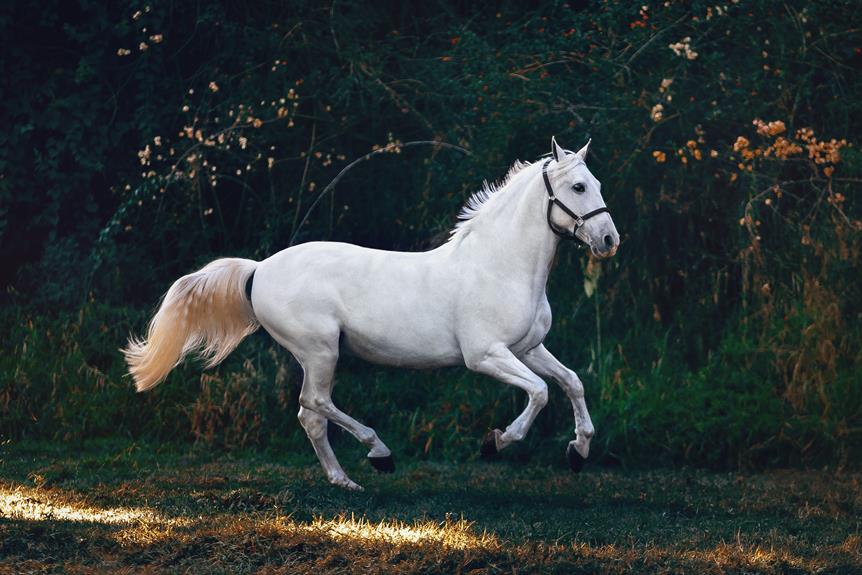Have you ever wondered how to calculate a horse's age in human years?
Well, let's take an example: imagine you have a horse that is 10 years old. According to the general guideline, for the first three years of a horse's life, each horse year is equivalent to 6 1/2 human years.
But what happens after that? How does the aging process continue?
Understanding the different stages of a horse's life and how they correspond to our own can provide valuable insight into their overall health and well-being.
So, let's dive into the fascinating world of horse years to human years and unravel the mysteries of equine aging.
Key Takeaways
- Horses mature at a different rate than humans, with their equivalent of the first three years of human life occurring in their early development stage.
- The prime years for horses typically start at around eight years old and last until around 13 years old, during which they reach their physical peak and mental maturity.
- Middle-aged horses, between 14 to 19 years old, require increased maintenance and care, including regular veterinary check-ups.
- Senior horses, aged 20 or older, require special attention due to changes in behavior, difficulty maintaining muscle and weight, and the need for appropriate care and nutrition.
Early Development in Horses
During early development in horses, they undergo rapid growth and change, reaching 90% of their height by one year old. In terms of horse years to human years, this stage is equivalent to the first three years of a human's life. Horses age much faster than humans, and their early development is crucial in shaping their future growth and behavior.
At this age, horses are like young children, experiencing significant physical and mental transformations. Their bones are still growing and their muscles are developing, making them agile and full of energy. It's important to provide them with proper nutrition and care during this time to ensure their healthy development.
Horses also reach an important milestone at two years old, when their knee bones fuse. This marks the end of their early development phase and the beginning of their adolescence. It's during this stage that they start to become more independent and can handle more physical and mental challenges.
Early training and socialization are vital during this period. Young horses have a short attention span, so training sessions should be kept short and engaging. Consistent and patient handling is essential for their understanding and cooperation.
Maturity in Horses
Horses typically reach maturity around four to six years old. However, it's important to note that different breeds may mature at varying rates, with some taking longer to reach full maturity. At four years old, horses are about 20.5 human years, according to the age chart. But reaching full height isn't the only marker of maturity for horses. They continue to fill out and develop muscle after this point.
As horses mature, they undergo significant changes both physically and mentally. They become more focused and better understand training concepts. With increased experience and confidence, they also become less reactive. This development plays a crucial role in their ability to perform various tasks and engage in different activities.
It's interesting to note that horses reach their prime starting at eight years old. At this age, they can work harder and reach new levels of training. Just like humans, age affects horses in different ways. Some horses may show signs of aging earlier, while others may remain active and healthy well into their senior years.
The Prime Years
As horses enter their prime years, their physical and mental development reaches its peak. This is a crucial period in a horse's life, where they're fully matured and capable of meeting higher demands in training and performance. Here are some key aspects to consider during the prime years:
- Age range: The prime years typically start at around eight years old and can last until around 13 years old. This is the time when horses are at their physical best and mentally mature.
- Training and care: During the prime years, horses can handle more intensive training and workloads. However, care requirements may vary depending on the level of activity and training. Performance horses, for instance, may require additional dietary supplements to meet their energy needs.
- Injury prevention: It's important to take preventive measures during the prime years to avoid injuries. Although horses are physically capable, overexertion or improper training techniques can lead to strain and injuries. Regular monitoring and proper warm-up routines are essential to maintain their wellbeing.
In horse years, the prime years are equivalent to the prime of human life. Just like humans in their prime, horses in this stage are strong, agile, and mentally sharp.
Horses Reaching Middle-Age
Now that we've covered the prime years of a horse's life, let's shift our focus to when horses reach middle-age. Middle age for horses typically falls between 14 to 19 years old. Just like humans, horses in middle age may experience changes that require increased maintenance and care. Regular veterinary check-ups become more important as these senior horses may be more prone to health issues. It's important to keep an eye on them and address any issues promptly.
As horses progress through middle age, they may mellow out and become less reactive. This makes them great companions for beginner riders or those who prefer a more relaxed ride. However, it's important to note that each horse is unique, and factors such as breed, genetics, and overall health can also play a role in their behavior.
In terms of workload, older horses may not be able to handle the same level of activity as when they were younger. Their capacity may decrease, and it's important to adjust their workload accordingly to avoid putting too much strain on their aging bodies. Additionally, older horses may require more frequent rest breaks during exercise to prevent fatigue and reduce the risk of injury.
It's worth mentioning that the oldest horse on record, named Old Billy, lived to be an astonishing 62 years old. While not every horse will reach such an impressive age, providing proper care and attention to our equine companions can help ensure they live a long, healthy life.
Senior Horses
When horses reach the age of 20 or older, they're generally classified as senior horses in horse years, which translates to being equivalent to 60+ human years. As your horse enters its senior years, there are a few important things to keep in mind:
- Changes in Behavior:
Just like humans, senior horses may experience changes in their behavior. They may become cranky or quieter and calmer. It's important to pay attention to these changes and make any necessary adjustments to their care and routine.
- Physical Changes:
As senior horses age, they may have difficulty maintaining muscle and weight. They may also move more stiffly. To help counteract these changes, it's important to provide them with light physical activity, such as easy walks, to help maintain muscle tone and overall health.
- Consult a Veterinarian:
Senior horses have different nutritional needs than younger horses. Consulting with a veterinarian is necessary to determine appropriate dietary supplements and care for your senior horse. They can provide guidance on the best diet and exercise regimen to ensure your horse stays healthy and happy in its golden years.
Frequently Asked Questions
How Old Is a Thirty Year Old Horse in Human Years?
A thirty-year-old horse is about 78 human years old. Factors like genetics, nutrition, and medical care affect the aging process. Horses and humans have different lifespans, but the concept of 'horse years' can be inaccurate. Aging horses may face health issues, so maintaining their well-being is crucial. Genetics play a role in determining lifespan, and historically, horse lifespans have changed over time.
How Old Is a 15 Year Old Horse in Human Years?
You can determine the equivalent human age of a 15-year-old horse by considering the rate at which horses age compared to humans. Factors like genetics, nutrition, and exercise also play a role.
How Old Is 32 Horse Years in Human Years?
In horse years, 32 is equivalent to being around 90 in human years. Factors affecting aging in horses include breed, genetics, and overall health. Proper horse care is essential for promoting longevity.
How Old Is 10 Years Old in Horse Years?
You would be 25 years old in horse years. Horse years one to three equal 18 human years, and from the age of four, the equivalency changes to 2 1/2 years.
Conclusion
So, if you want to know how old your horse is in human years, remember that the first three years of a horse's life are equivalent to 6 1/2 human years each, and after that, each horse year is equivalent to 2 1/2 human years.
However, keep in mind that various factors can influence a horse's aging process, just like with humans. Take good care of your horse and provide them with the necessary nutrition, exercise, and medical attention for a healthy and happy life.



0 Comments